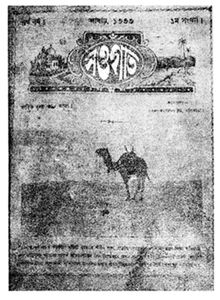Saogat, also called Saugat (transl.Presentation), was a leading Bengali literary journal. First published in Calcutta [1] in 1918, its editor was Mohammad Nasiruddin. [2] Abdul Karim, a scholar, also edited the magazine, [3] which was published on a monthly basis. [4] It mostly covered the work of Bengali Muslim authors [1] and supported for the involvement of Bengali Muslim women in literary activities. [2] [5]

The publication of Saogat was kept suspended in 1922 due to financial constraints. In 1926, its publication was resumed and since then it continued uninterruptedly until 1947.